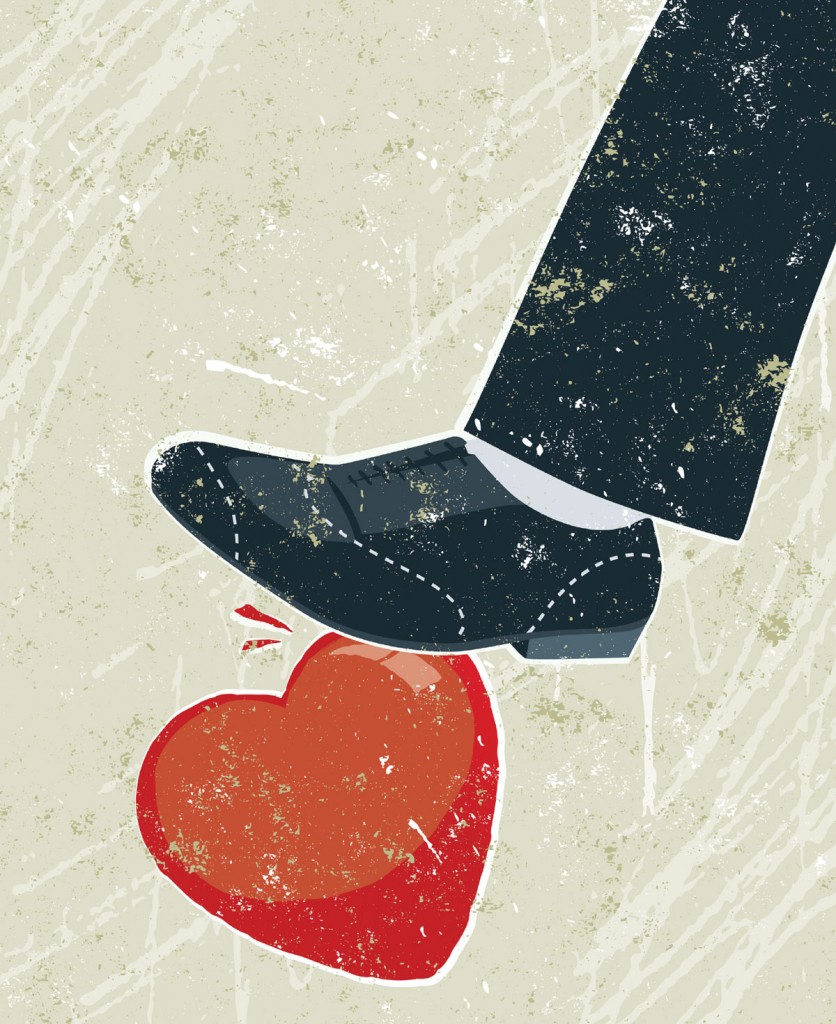Of late, I’ve been inspired by certain formerly loving couples in my social sphere who’ve elected to, well, uncouple—and made the separation swiftly, bravely, even adventurously. I’ve witnessed husbands and wives—and wives and wives—share child custody like champs. I’ve also walked brisk Lake Montebello laps with the same friends who need time to cry… because the process is not simple.
Here, five Baltimoreans reflect on the deep ways in which divorce—their own or someone else’s—has changed their lives, for better or worse.
Childhood Sweethearts
Shortly after my ex-husband and I separated, we were shocked to learn that indie-rock royalty Kim Gordon and Thurston Moore of Sonic Youth were getting divorced. I remember the email my ex sent me, along with a link to an article about the unexpected split. It simply said: “Copy cats.” I laughed for what seemed like the first time in weeks. Then, in a more familiar vein, I cried.
Nothing dramatic occurred to lead to the end of my marriage, though the end itself was its own drama, the process of grieving messy and prolonged. Those two words—“copy cats”—steeped in resignation, stuck in my head. So did the sense that divorce had become as commonplace among my peers as bar and bat mitzvahs in middle school, weddings in my mid-20s and baby showers soon after that. Of course, Gordon and Moore were hardly in my social circle, but each month seemed to offer a new example of a friend’s failed marriage.
After my best friend and her soon-to-be-ex-husband decided to separate, he told me, “It’s your fault,” only half-joking. In the not too distant future, several more acquaintances followed suit, which came with an almost surreal redistribution of furniture and swapping of rented houses. And another close friend moved out of her family home, the years-long question of divorce finally answered.
My best friend joked that divorce was a plague and I was Patient Zero. Of course, we recognized that there was no real causal relationship, but it was hard to deny that a pattern was emerging. If marriage was the devil my friends knew, then my divorce provided a glimpse at the devil they’d been wondering about. Not that my life as a newly single woman was a ringing endorsement. My navigation through those first months was, at times, graceless. My post-divorce weight loss left me skeletal, I burst into awkward tears at ill-timed moments and my loneliness drove me into a series of disastrous relationships, the most enduring of which was with a bottle of Svedka. Yet, however terrifying I found the vast uncertainty of my new life, it also promised possibility and hope.
My husband and I met as freshmen in college and got married right after graduation. Indeed, marrying young seems to be a common denominator in the relationships I have seen fall apart around me. And the timing of the divorces—after the kids are in elementary school or older, after jobs and homes and routines have been in place long enough to breed ennui and even resentment, but before we’ve hit menopause, before we’ve succumbed to elastic waistbands and mom jeans, before we’ve stopped noticing the handsome fathers of our children’s classmates—makes sense. We still have time.
One upside of the ubiquity of divorce is that there is a deep dating pool. In fact, many of my newly single friends have found new partners—some so successfully that I wonder if a new era of second weddings is not far away. Already the era of second chances is here.
Award-winning poet Elizabeth Hazen teaches at the Calvert School.
The Other Mother
It’s winter and I’m laughing over a bowl of chili as my 11-year-old daughter, Emma, unwraps birthday gifts. I am at her father’s house, but he isn’t here. His wife, Olive, is balancing their toddler on her knee as she alternately takes bites of chili and pictures of Emma.
For a little over a year, Olive and I have been navigating life without Eric, the father of our two girls. He was diagnosed with a mental illness last year and has been struggling to find his footing ever since. Earlier this year, when I was awarded sole custody of my daughter, I made the decision to carry on as normally as possible with Emma’s living arrangements and schedule. For as long as she can remember, Emma has split her time equally between her dad’s house and mine. I felt that his absence would be hard enough without also missing her sister and Olive. So, now, Emma spends one week with me and then spends the following week with Olive.
Many people share custody of their children with their ex, but few share custody with their ex’s current spouse. Even when Eric was on the frontlines with us, we two ladies ran the show—although back then, Olive and I shared little about our personal lives as we arranged babysitters and birthday parties, carpools and dentist visits, and the hundreds of other things parenting requires. She has always treated Emma like her own child—to no one’s surprise, that didn’t change when she had her daughter last year.
There are people who would say that she is a new mom—and in some regards that is true, but in my opinion, Olive has been a mother for over a decade. In my absence, she has packed lunches, wiped butts and noses, kissed boo-boos and celebrated victories. Over this past year, we have spent nights crying on the phone, days holding hands in courtrooms and countless hours watching our girls grow into themselves. She has been a mother to my daughter when no one was looking and an unwavering friend to me.
Celia Kipp is a musician, mortician, creative writer and mom— she lives with her family, including Angus the cat, in Baltimore.
When You’re Catholic
I did not ask to be Catholic, nor did I seek to be divorced.
The holy oils of baptism were brought to me when I was an infant. The dissolution of my marriage to a Catholic girl from Dundalk occurred 30 years later—brought on myself.
I believe in much (certainly not all) of what the Roman Catholic Church stands for, primarily charity, education and compassion.
But the Catholic Church does not believe in divorce.
What’s a Mount Saint Joseph High School boy to do?
I never turned my back on the Church, but there were many years when it didn’t interest me. Divorce brought me to my knees in 1988, and it was two years before I began to find solid ground after an unexpected trip to Lourdes.
Millions go there for healing. I went as a tourist who happened upon the Grotto en route to Spain, asking for nothing but somehow receiving everything.
Back in Baltimore, I sobered up, began to grow up and—drawn to the mysticism of the Eucharist and mercy—started going to Mass. Briefly, I looked into annulment and learned that true Catholic marriage cannot occur if one of the partners is “not in their right mind” when vows are made.
I was 22 years old when I said “I do,” but what I mostly did was anything I pleased.
At 57, I still do pretty much as I please. What has changed— and to Our Lady of Lourdes goes the credit—is what pleases me. I attend Mass many times throughout the year—never missing All Souls’ Day—and practice the rosary and the corporal acts of mercy.
The fact that I am divorced from a fellow Catholic with whom I received the sacrament of marriage rarely occurs to me, much less bothers me. We have never been closer.
Last year, I married a woman whose father was a Jewish atheist, her mother a casual Episcopalian. The ceremony took place in the parlor of my Greektown rowhouse.
Our officiant? An Orthodox rabbi from the Park Heights Avenue shtetl.
Catholicism is my birth-right. I am Catholic because I say I am.
Former Sun reporter Rafael Alvarez’s new collection of nonfiction is called Crabtown USA.
Another Life
My childhood home was a beautiful brick house on a hill covered with cornfields and forest. My earliest memories are of playing outside, planting flowers with my dad, helping my mom cook in our farmhouse kitchen. Today, these seem like images from another life, though my parents split up when I was 7 and I’m just 15 now.
By the time kids reach double digits, they know that marriages fall apart, that people who love each other may not stay together forever. My parents’ antagonism was such a part of the air I breathed that it almost felt like nothing. There were no sides, no bad guys or heroes. They fought and fought, and I didn’t know why and then my dad moved out.
“Are you sad that we don’t live with your dad anymore?” my mom asked me one night when she was giving me a bath.
“Well, of course I miss him, but it was for the best, wasn’t it?”
This practical, unemotional response was comforting to my mom, and maybe that’s why I said it, or maybe I was just ready for everything to stop: the yelling and the tension and sadness. On the other hand, though my view of the situation was blurry, I saw what I was losing. I would never again live with two parents who loved each other.
I didn’t love my mother or my father less after the divorce. I don’t have any lasting trauma or the feeling that I was robbed of a perfect childhood. My idea of love is not forever marred.
I spend a lot of time in the car, driving the hour and a half between my mom’s row-home in North Baltimore and my dad’s old schoolhouse in rural Pennsylvania, where there are cornfields and forest and we wander them like the olden days, in between binge-watching “Scandal.” I wish I got to see my dad more often—as I grow older and busier, not every Saturday night is free.
Seeing some of my friends’ parents married, in love and happy makes me jealous. But the unhappy situations that others deal with bring back my bathtub epiphany: It really can be for the best.
Jane Winik Sartwell is a sophomore at Friends School, where she edits the community section of the newspaper.
The Hours
My parents divorced when I was 10, because my father was sleeping with a cocktail waitress named Josephine. I’ve long stopped pretending it wasn’t a big deal.
Forty years later a close friend had left her husband. She was in a fragile state and, over a birthday lunch in Lutherville, voiced her worries about how the split might affect her 5-year-old son. I offered her what reassurance I could, drove home in a daze and immediately called my mother.
Until that lunch, I had always considered my parents’ divorce a trauma that had happened to me, not to them. Here I was, a writer, ideally an observer and explainer of humans in action, 15 years older than my mother was when she told my father to leave, and I had never asked her, not once, how she had felt going through it.
“It was agony,” she said, oddly amused by the question. “Four kids, a big house, no job experience. I couldn’t eat. I lost 30 pounds. I was never so skinny.”
I apologized for any bad behavior I might have exhibited.
“You were fine, honey. And your sisters were little. But your brother was rough on me. He blamed me until I told Fred he had to tell you about Josephine.”
Suddenly, I had a lot of questions. How did you find out? Where were you when you confronted him? What did he say? Did you ever meet her? Old enough now to know that some marriages survive such tests, I finally asked my mother why she hadn’t simply waited Josephine out.
“Well, I began keeping a little calendar, the kind you used to get free at the bank. I would record the number of waking hours that your father would spend at home with us. When it got down to three and a half hours a week, I decided that was it.”
Sixteen years of marriage reduced to a checkbook insert. I apologized again, told her I loved her and hung up. It had taken me four decades to acknowledge her loss. I’d have a much tougher set of questions to ask my father, had he lived past 48.
After 17 years together, James Magruder married Steve Bolton on the last day of 2015.
Divorce Lore
Smart cookie. In 1916, physicist Albert Einstein promised his then wife, Mileva Einstein-Maric, also a scientist, and the mother of their twins, any future monies from the Nobel Prize he expected to win soon—if only she would let him divorce her. The realistic Maric agreed, but didn’t score the sustainable cash till 1921.
Come on! Comedian Russell Brand was eligible to receive half of his ex-wife Katy Perry’s millions earned during their marriage, but he sweetly declined.
Wow. Only one U.S. President has been divorced: Ronald Reagan, who was married to actress Jane Wyman from 1940 to 1948, then wed actress Nancy Davis in 1952.
Makes sense. People in second marriages are less likely to get divorced because of the wisdom gained their first time around according to the Marriage Foundation.
Take a breather. Most people marry again only after waiting three years post-divorce.
Face it. One-third of all divorce filings in 2011 contained the word “Facebook,” according to Divorce Online. #meetandcheat #stepoffmyhusband’spage #youhadmeatfriend #let’sditchourspouses





